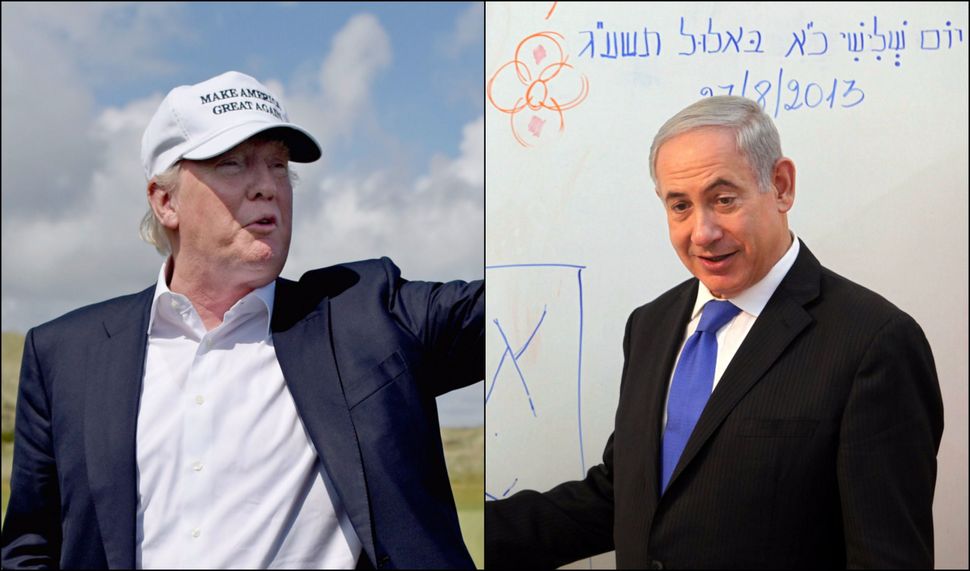Immigrant Fearmongering From Donald Trump to Benjamin Netanyahu

Image by Getty Images
In this bewildering political season, the least fortunate people — and especially immigrants — have become targets of opportunity for right-wing politicians around the world. The immigrants are used as foils. They are used as scapegoats. They are used to distract from the failures of these politicians to provide for the needs and to answer the concerns of their citizens, immigrant or not.
In America, Donald Trump has built his popularity by declaring that Mexican immigrants are drug dealers, criminals and rapists, by suggesting that a judge of Mexican heritage could not be partial in hearing a case being brought against the Republican candidate, and of course, by claiming that the answer to America’s problems is building a wall between the U.S. and Mexico — one he inexplicably insists Mexico will pay for.
This rhetoric scores political points by stoking our most basic human instinct: fear. And it creates a climate in which a constructive national dialogue about issues of great importance is all but impossible. In a Donald Trump America, reasonable proposals in favor of more humane immigration policies — not to mention any effort to help manage the global refugee crisis — could well be nonstarters.
Anti-immigrant sentiment is not just an American phenomenon. It is a global one. The pro-Brexit campaign struck many of the same notes. In Europe we have seen the resurgence of hard-line anti-immigrant sentiments from Demark to Switzerland and to Sweden. Israel, too, is not exempt from this trend.
Two weeks ago, Prime Minister Benjamin Netanyahu pounced on a decision made by the city of Tel Aviv to stop accepting students from outside the city to a highly-regarded public high school in the city so that more resources could be directed to students — including a large number of children of African migrants — who live in the school’s neighborhood.
Netanyahu issued a statement falsely accusing Tel Aviv mayor Ron Huldai of closing the school and said that the mayor should be “ashamed” of his actions. The resulting media coverage prompted demonstrations against Huldai in which pictures of him were burned.
This episode came on the heels of a decision by Netanyahu’s defense minister, Avigdor Lieberman, forbidding all IDF soldiers from volunteering to help the children of African asylum-seekers in Israel, even during their free time.
These episodes are warning signs. We American Jews whose worldview is informed by the lessons of Jewish history — in which similar marginalizing rhetoric repeatedly proved to be a precursor to violence and exile — understand that this xenophobia is simply unacceptable. Not in our home here in America, and not in the Israel we love.
There is room for cautious optimism that this extremism will not win out.
In America, many Republican leaders have spoken out against Trump’s most hateful statements. And while his hard-line anti-immigrant proposals have won him favor among a few groups, they’re also pushing others away. Just last week, after Trump’s major speech on immigration, fully half of his Hispanic Advisory Council resigned in protest.
In Israel, the pressure brought by the prime minister and the defense minister did not cause Tel Aviv mayor Huldai to fold. He took to the media to aggressively defend his commitment to provide services to all of the residents of his city, including the African asylum-seeker community. His principled stand is backed by many residents of his city — and many more Israelis across the country — precisely because it speaks to the values of inclusion, of equality, and of compassion.
Let none of us forget that Israel was founded as a haven for a persecuted people. The country is home to many civil society organizations, such as the Hotline for Refugees and Migrants, that work to care for the needs of the asylum seekers in Israel.
The value of social justice is deeply ingrained in the Israeli psyche, just as fairness is a core value for most Americans. Now is the moment for progressives in both countries to pay attention, to heed the warning signs, and to join forces to put the genie of xenophobia back in the bottle.
Daniel Sokatch is the CEO of the New Israel Fund, which supports democracy and equality for all Israelis.
A message from our Publisher & CEO Rachel Fishman Feddersen

I hope you appreciated this article. Before you go, I’d like to ask you to please support the Forward’s award-winning, nonprofit journalism so that we can be prepared for whatever news 2025 brings.
At a time when other newsrooms are closing or cutting back, the Forward has removed its paywall and invested additional resources to report on the ground from Israel and around the U.S. on the impact of the war, rising antisemitism and polarized discourse.
Readers like you make it all possible. Support our work by becoming a Forward Member and connect with our journalism and your community.
— Rachel Fishman Feddersen, Publisher and CEO























